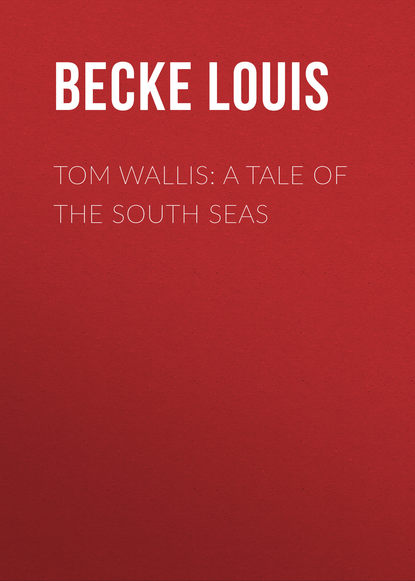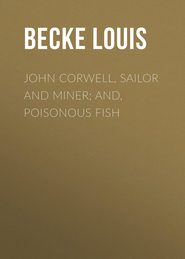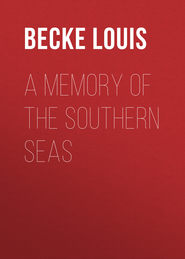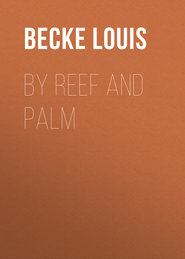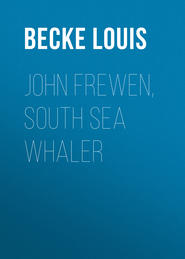По всем вопросам обращайтесь на: info@litportal.ru
(©) 2003-2024.
✖
Tom Wallis: A Tale of the South Seas
Настройки чтения
Размер шрифта
Высота строк
Поля
'It is certainly a coincidence, Jack; but surely it cannot be anything more,' and Mr. Wallis looked at Casalle, as if wishing for confirmation of his views.
The seaman nodded. 'A coincidence, sir, no doubt; but yet-' he paused a moment, 'some very strange things do occur at times at sea. Did not the captain of the Virago say that the Lady Alicia was going northward to New Britain?'
'Yes.'
'And my brother in his letter says that Hayes was coming from New Britain, bound to Samoa. Can it be that the two ships have met, and, by some means, Tom and the half-caste officer left their own vessel and went on board the Leonie?'
Mr. Wallis thought for a few moments before replying.
'It is very disturbing to think about. Your brother says there was heavy fighting on board Hayes's ship, and that the Sydney brig lent Hayes an officer; but then the young lad is spoken of as being a passenger on board the Leonie-not on board Tom's ship. No; after all, Jack, I do not think we need distress ourselves. But, anyway, let us drive out to Mr. Biffen's house. He may be able to tell us if there are any other brigs in the South Sea trade sailing out of Sydney.'
A short drive brought them to the agent's house, and Mr. Wallis at once mentioned the suspicions which had arisen in Jack's mind, and asked him if there were any other Sydney trading brigs likely to have been cruising about the Solomons.
Mr. Biffen at once answered, 'No, no brigs; of that I'm certain. I know every vessel sailing out of Sydney (and Melbourne as well) which is an island trader. There would be about there at that time the barques Anna and Lightning, and the schooner Meg Merrilies, but no brig. The only other vessel of that rig besides Hawkins's ship which would be seen down there, is the Mexicana, and she has been laid up here for the past six months. It certainly is curious, I must admit, but it is only a coincidence, as you surmise.'
But, in spite of this opinion, both Mr. Wallis and Jack left the agent's house feeling somewhat depressed and anxious.
'We can only wait, Jack, and trust in God. The Lady Alicia may be here in a few weeks now.'
As the time went by, however, even Jack ceased to let the matter trouble him much, and, like all bush-bred boys, entered into the delights of Sydney life with a zest. Unlike Tom, ships and sailors possessed no interest for him beyond that which had lately become engendered in his mind through Tom himself; nevertheless, he and Henry Casalle spent much of their time in sailing about the harbour, watching the great merchant clippers entering the Heads, or being towed to sea; at other times, taking little Nita with them, they would spend the day fishing in one of the countless bays of the Harbour, or on the bright waters of the Parramatta River or Lane Cove.
Early one warm, drowsy afternoon, as Jack, accompanied by Nita only, was returning homewards from a fishing excursion, and the boat was sailing slowly between Goat Island and the Balmain shore, he saw that signals were flying at the Observatory flagstaff, 'Ship from Fiji Islands.'
Knowing that the Malolo was due, Jack took down the sails, got out his sculls, and sent the boat skimming over the water to town.
'Perhaps it is the Malolo, Nita.'
Nita's black eyes danced with delight, but, having something of her father's grave manner, she did not pester Jack with childish questions. Pulling in to Miller's Point, Jack left the boat with the owner, and in a few minutes he and Nita were hurrying along the squalid streets leading from the Point into the city proper. Almost as soon as he entered the hotel, Mary Potter, Nita's nurse, ran up to him.
'Mr. Wallis and Mr. Casalle have gone down the Harbour, sir, in the Customs launch; the Malolo is come in. And will you and Miss Nita follow in a waterman's boat down to Woolloomooloo Bay, where the ship will anchor? I won't be five minutes dressing, Miss Nita.'
The walk from Petty's Hotel to the Circular Quay only took a few minutes, and as soon as the boat rounded Fort Macquarie Jack saw a large white-painted barquentine, which he knew was the Malolo, just being cast off by a tug, as she anchored between Lady Macquarie's Chair and Garden Island. The moment the boat came alongside, Captain Casalle, who had been talking to his brother and Mr. Wallis aft, ran down the gangway ladder, and caught his child up in his arms.
'How are you, mister?' said a cheerful voice to Jack as soon as he reached the deck; and his old acquaintance, Mr. Brooker, the mate, gave him a hurried handshake as he passed along for'ard; 'here we are back again, safe and sound, with our pockets full of dollars and our hearts as sweet as honey, and right glad I am to see you again.'
Several native sailors, whose faces Jack at once recognised, rushed up to him and shook hands. They were members of the old crew of the lost Bandolier.
Going aft, Jack saw a pretty picture-the two brothers, whom fate had thus brought together so strangely after more than twenty years, and when each only thought of the other as dead, were walking the deck together hand in hand, speaking in low but eager tones, with little Nita clinging tightly to her father's disengaged hand, looking into his face and drinking in every word he uttered.
As soon as possible the captain, his brother, Nita, and Mr. Wallis went ashore, leaving Jack to spend an hour or so on board with the mate, and then follow and join them at dinner.
Whilst the active mate (whose manner of addressing the crew Jack thought to be extremely personal and vigorous) was getting the decks cleared, and the ship made snug, before sitting down to chat, Jack had time to have a better look at her. Next to the Virago, she was the largest vessel he had ever boarded, and although externally her white-painted hull was reddened and yellowed with rust stains, within board she was spotlessly clean and neat, and her lofty pitch-pine spars were as bright and smart-looking as those of a crack yacht. She carried three boats-a long boat, which was stowed on the main hatch, and two beautifully moulded whale-boats, one on each quarter. She was a flush-decked vessel, and of great beam for her tonnage, with a sheer that would not be perceived until one actually stood on her deck, either for'ard or aft, and looked right along it.
Going below to the cabin, he was met by the steward, a brown-skinned, smiling-faced Samoan, who, putting his arms around Jack's shoulders, rubbed noses with him as he shook his hand.
'Don't you 'member me, Mister Jack? Oh, I never forget you and Kooringa, never.'
'Of course I haven't forgotten you, Salu, but I thought you were a sailor on the Bandolier. Now you are a steward.'
'Yes, sir. You see, sir, my sister Solepa was fafine tausi teine (nurse) to Mrs. Casalle's Nita. And now Mrs. Casalle and Solepa are dead and gone to God, and I am Salu, the steward to the captain; and now I am glad, very glad, for I hav' hear that your brother never is dead.'
'No, Salu, he is not dead. He will soon be here in Sydney, I hope.'
The steward smiled delightedly. 'I am glad; every one on boar' this ship is glad. Your fath' is a good man. Now, if you please, let me make you some coffee.'
'No, thank you, Salu,' said Jack, shaking the man's hand, as he looked around the cabin and noticed the number of Snider rifles and cutlasses arranged in racks on both sides. 'What a lot of arms, Salu!'
'Yes, sir. We go to some bad places. Sometimes we have to fight, but Capt'en Casalle never want to fight. He always go ashore first when we go to some new place where the natives is wild and we want to trade. He won't let the covering boat come too close, because these wild peoples, when they see the rifle and the cutlass, they get afraid and begin to shoot poison' arrows. He just jump out of boat and walks up on th' beach, with his han's in his trousers' pocket, and smokin' his pipe; an' he says to those wild people, "What's the matter with you? I hav' come to talk an' trade, not to fight. I am not a fighting man. I wan' to buy your copra an' ivory nuts. See, I have no little gun," and then he lifts up his pyjama pocket and show them his bare skin, wis'out no revolver strapped to his waist. Oh, he is a fine man, a good man.'
Mr. Brooker came rattling down the companion way.
'Oh, here you are, Jack. Now, look here, here's the whole lot of the old Bandolier's crew wants to shake hands with you again. And so do I, Jack,' and he seized Jack's hand in his and wrung it vigorously. 'I reckon I've got some new ideas about British people since I struck Port Kooringa. I was brought up pious enough by a father and mother who believed that the only good people ever produced by Great Britain were the Mayflower folks; and then in the village school I was taught to consider the Britishers of those times as inhuman bein's, who with a mob of Hanoverian or other Dutch-bred soldiers jest delighted to kill American farmers, and their wimmen folk and children, by sticking bayonets into them as a sorter light amusement. Yes, thet is so, Jack. I come from Martha's Vineyard, and us boys were always taught to hate Britishers. We are a mighty poor lot of people down thet way, and the farming folk are the poorest of all-only get a square meal once a week. They'd look sour at a barrel of cider for working after twelve o'clock on Saturday night, and kick a cat for catching a mouse on Sunday morning. But, say, let's get on deck again; these men want to see you mighty bad before you go ashore again. They hev' got something to give you.'
Lighting a huge cheroot, he led the way.
All the crew of the Malolo were gathered together on the main deck, awaiting Jack's appearance. Every man had a present of some kind-a bundle of Solomon Island spears, bows and arrows, baskets of magnificent shells, snowy white coral, clubs, native fish hooks, made from iridescent pearl shell, a whale's tooth, necklaces of porpoise teeth, shell armlets, carved coco-nut shells, and many other curios from the savage islands of Melanesia. Placing them upon the deck at Jack's feet, they drew back, and their spokesman, a sturdy, square-built native of Rotumah Island, made a short speech-
'All these things here me and my shipmates bring you because we want to give you something. All the time we stop at Kooringa, your father and you and old man Mr. Foster very kind to us all, and woman with red hair give us plenty kai-kai.[3 - Food.] That woman is good woman, and me and my shipmates very sorry we can' see her no more. So if you please, sir, good afternoon, and very much oblige'.'
Simple as were the man's words, their sincerity was very pleasing to Jack, who thanked them individually, shaking hands with them all. Most of them were natives of the South Sea Islands; one came from beautiful and verdant Rotumah; another from lonely Easter Island in the far eastern Pacific; two from Nuié-the 'Savage Island' of Captain Cook; one from Yasawa in Fiji; and the remainder from various island groups in the South Pacific.
Mr. Brooker regarded them with a good-natured smile before telling them to go for'ard again; then he turned to Jack, and said quietly-
'I was taught to despise niggers of any kind or breed, but this sort of thing jest jumps up and hits me in the face. I never yet saw many white sailors show any gratitude or remembrance for a good turn. Jack Tar is generally Jack Dog, and a darned or'nary yellow dog, with nary a good point about him. Why, every one of these natives aboard is a Christian, and lives clean in mind and body. You should see 'em in the evenings sitting on the main hatch, every man with his Samoan Bible or hymn-book in his hand, and waitin' for Salu the steward to begin the service. It's jest good to hear 'em sing! Where is the crowd of white sailors who'd have the courage, even if they had the inclination, to do as these men do, night after night! And every one of 'em is a right down smart sailor man. Now come below into my cabin, and we can hev' some talk. I want to hear all about your brother Tom, and where in thunder the skipper's brother come from, and all about the folks at Port Kooringa. Come on; the second mate will look after the ship.'
CHAPTER XIV
THE MALOLO SAILS IN SEARCH OF TOM
The following two weeks passed very quickly, Jack and his father and the two brothers being constantly in each other's society. The Malolo, after discharging her cargo, went into dock and came out again a bright shining white, and Mr. Wallis and the captain set about buying trade-goods for her next voyage. The second mate was paid off, and Henry Casalle shipped in his place, much to his satisfaction.
Late one night, after Jack had turned in and his father was about to follow, a hansom drove up to the hotel, and a short stout man, wearing a frock-coat and tall hat, jumped out, and for two or three minutes poured out a torrent of abuse upon the construction of the vehicle and the anatomy of the horse.
'And as for you, my joker,' he said to the cabman, 'you think that I don't know you've brought me by the most circumbendious route you could think of you thundering swab trying the great circle dodge on a poor old sailor.'
'Oh, come now, captain, don't say that. I've driven you a good many times, and hope to do so again.'
'Do you? Well, you won't; what's the figger I have to pay you for betraying me into your crazy old rat-trap?'
'Nothing at all-not to-night, anyway, skipper. You ain't in a good temper. Shall I wait for you?' replied the cabman, who evidently knew his fare.
'No, but come back for me in an hour. And here's five bob.'
Just as Mr. Wallis was ascending the stairs, he heard the stranger's voice, speaking to the hall porter.
'I want to see Mr. Charles Wallis of Port Kooringa young man; tell him that Captain Samuel Hawkins of the brig Lady-'
Mr. Wallis ran up to him with outstretched hand.





